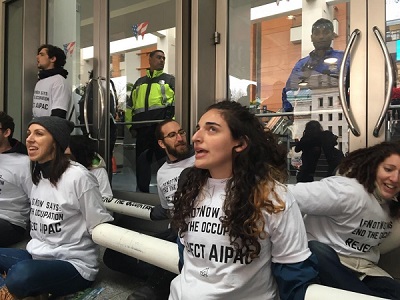
By Jonathan Cook – Nazareth
Few books on Palestinian history become bestsellers. But one, titled A History of the Palestinian People: From Ancient Times to the Modern Era, managed to rocket to the top of Amazon’s charts this month.
Its author, Assaf Voll, an Israeli academic, claims to have reviewed “thousands of sources” to explain “the Palestinian people’s unique contribution to the world and to humanity”.
However, when Amazon realized all the book’s 130 pages were blank, it hurriedly excised the title from its site. But not before hundreds of customers paid nearly $10 to enjoy the puerile joke. Speaking on Israeli radio, Voll observed: “Someone needs to tell them [the Palestinians] the truth, even if it hurts.”
A History of the Palestinian People has famous antecedents. In 1969, Golda Meir, then Israel’s prime minister, declared to the world: “There were no such thing as Palestinians.”
Fifteen years later, a book called From Time Immemorial won acclaim from scholars and newspapers across the United States. It argued that the Palestinians were not the native people of Palestine, but recent economic migrants taking advantage of advances made by the Ottoman Empire.
A talented Jewish doctoral student, Norman Finkelstein, exposed the book as a fraud and it was gradually forgotten.
An Israeli official called Peters in 2015, shortly before her death, to thank her on behalf of prime minister Benjamin Netanyahu “for all she had done for Israel”.
Both Voll and Peters were only echoing Israel’s popular historical narrative. In Israeli museums, the Palestinians’ presence is obscured with cryptic references to an “Ottoman” period. Like the Romans, Crusaders, Mamluks and British, the Ottomans are presented as temporary occupiers. Israeli politicians and media regularly speak of modern Palestinians as squatters and trespassers.
Israelis have been only too happy to make the Palestinians vanish. Who needs to feel guilty about the dispossession of hundreds of thousands of “Arabs” in 1948, or about Israel’s brutal domination of millions more for half a century in the occupied territories, if they had no right to be there in the first place?
The antidote to Voll’s empty book is a new anthology of essays, including by leading Jewish and Israeli writers, that never forgets the Palestinians’ deep roots in the land and keeps its gaze fixed on the crushing realities of Israel’s occupation.
Last week, Pulitzer prize-winning author Michael Chabon said he had faced a barrage of abuse since the publication of Kingdom of Olives and Ash, designed to warn off others from following in his footsteps.
Israeli author Dorit Rabinyan, whose book on a love affair between a Palestinian man and Jewish woman was recently banned from Israeli schools, observed that visiting the West Bank was a way of “taking off the blindfold and opening our eyes to what is happening around us”.
One can understand why making the Palestinians invisible is the tactic of choice for Israel’s supporters. But a new report suggests that it would be wise for them to keep Israel in the shadows too.
The Brand Israel Group found that the more US college students knew about Israel, the less they liked it. In the six years to 2016, support for Israel among the next generation of Jewish leaders dropped precipitously, by 27 percentage points.
Traditionally, Israel has nurtured bonds to overseas Jews. Over the past 20 years the Birthright program has brought half a million young American Jews on free summer trips to Israel for an intensive course of indoctrination.
The students are supposed to leave fervent ambassadors for Israel – or better still, devotees who will immigrate to help in a demographic war against the Palestinians.
But organizers are aware that a growing number sneak off afterwards into the occupied territories to discover first-hand a history their elders have kept from them. It can have a profound effect. Many get involved in protests in the occupied territories or become leaders of boycott activism against Israel on campuses back home.
Tellingly, when Israel announced earlier this year it was banning entry to foreigners who support the boycott movement, hundreds coming on this year’s Birthright signed a petition asking whether they would be allowed in.
Signs of Israel’s troubles with the next generation of American Jews are already apparent. They are at the heart of a new project near Hebron in the West Bank of non-violent direct action against the occupation. Sumud Freedom Camp – “sumud” is Arabic for steadfastness – is a project between Palestinians, Israelis and foreign Jews who refuse to turn a blind eye to Palestinian suffering. It offers a new model of joint protest.
These young Jews hope their presence will protect Palestinians trying to reclaim lands stolen by Israel. But the army has repeatedly torn down the camp. One American Jewish participant wrote in the Israeli media of how her experiences had disabused her of the image of Israeli soldiers as “superheroes who’d protect me from harm”.
Increasingly, American Jewry is becoming polarized, between an older generation whose ignorance allows them to advocate unthinkingly for Israel and a young generation whose greater knowledge has brought with it a sense of responsibility. In an ever-more globalized world, this trend is going to intensify.
Young American Jews will have to choose. Will they conspire, if only through their silence, in the erasure of the Palestinians carried out by Israel in their name? Or will they stand and fight, in the occupied territories, on campus, in their communities and, soon enough, in the corridors of power in Washington?
(A version of this article first appeared in the National, Abu Dhabi.)
– Jonathan Cook won the Martha Gellhorn Special Prize for Journalism. His latest books are “Israel and the Clash of Civilisations: Iraq, Iran and the Plan to Remake the Middle East” (Pluto Press) and “Disappearing Palestine: Israel’s Experiments in Human Despair” (Zed Books). He contributed this article to PalestineChronicle.com. Visit his website: www.jonathan-cook.net.





Perhaps with the BDS and re-engaged anti-establishment Jewish youth, change may yet be in the future.